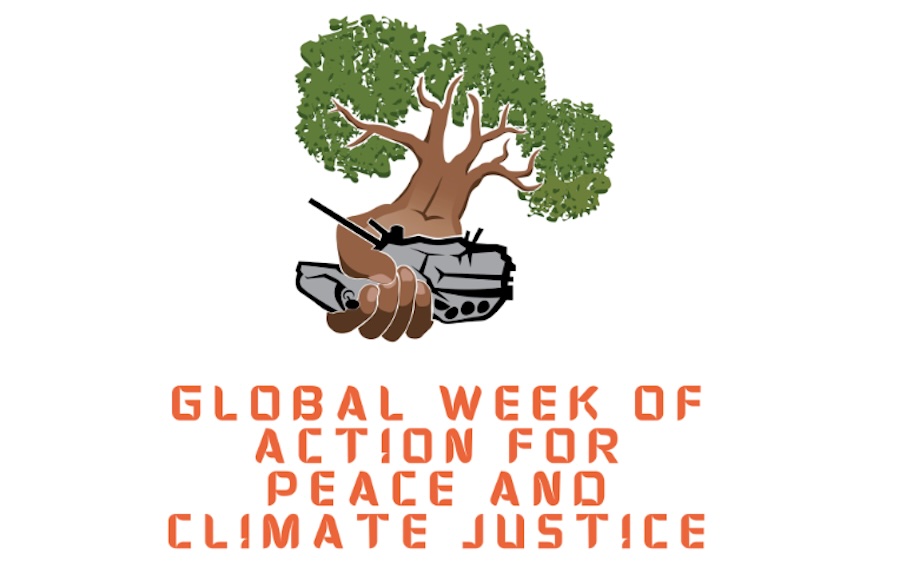. . SUSTAINABLE DEVELOPMENT . .
Excerpts from the website of Climate Militarism
The Week of Action for Peace and Climate Justice was launched in 2024 and runs yearly, involving a wide range of events and actions organised by groups around the world, from webinars to advocacy events to digital publications to demonstrations.

Working together, we will:
° Raise public awareness of the links between war, militarism/militarisation, social and climate injustice;
° Build connections between peace, climate and justice movements;
° And build momentum for collective action and policy making against militarism and for social and climate justice.
You can take part in the Week of Action from anywhere, by organising your own event, publication or action for peace and climate justice, or by promoting existing campaigns that address the WoA themes. Use the key resources on this website, especially the toolkit, to help you plan your event/action, and contact us for any other support.
The first-ever Global Week of Action for Peace & Climate Justice in 2024 brought together activists, students, researchers, and communities from every corner of the globe to demand an end to the militarised systems fuelling climate breakdown. Over the course of just one week — from 21 to 28 September — more than 60 coordinated events took place across at least 20 countries and five continents, creating a global wave of awareness and action.
The second Global Week of Action for Peace & Climate Justice took place September 15-21, 2025 and included events around the world as listed here.
The Week of Action for Peace and Climate Justice is being facilitated by a sub-committee of the Arms, Militarism and Climate Justice Working Group, including International Peace Bureau (IPB), Peace Boat, Stop Wapenhandel, War Resisters International (WRI), Scientists for Global Responsibility (SGR), The Conflict and Environment Observatory (CEOBS) and Transnational Institute (TNI). The wider global mobilisation effort taking place in September (see (see website here) is coordinated in part by the Climate Action Network (CAN), 350.org, Asian People’s Movement on Debt and Development (APMDD), War on Want, Global Campaign to Demand Climate Justice (DCJ) and the Climate Clock.
(Editor’s note: See CPNN article here about the Global Campaign to Demand Climate Justice (DCJ).)
(article continued in right column)
(Article continued from the left column)
Why?
War and militarism are causing climate breakdown and consuming essential resources needed to address social, climate and ecological crises. Next to taking lives and devastating whole communities, the build-up and use of armed force destroys lands and ecosystems, polluting waters, soils and air and leaving behind toxic remnants and unexploded weapons that cause harm to generations long after conflicts end. The world’s militaries account for 5.5% of global greenhouse gas emissions: if they were a country, they would be the world’s fourth largest national emitter. And still, militaries remain exempt from global reporting and reduction agreements. Further, military industries depend on vast amounts of metals, minerals and fossil fuels; the US military is the single largest institutional fossil fuel consumer in the world. Indeed, fossil-energy fuels both wars and climate disaster – and the shareholders profiting from fossil fuel extraction are closely linked with those profiting from global arms, mining and tech industries. Together, they drive global violence and injustice.
But some people argue militarism is part of the solution: that we need harder borders, more arms and bigger armies to cope with climate breakdown. They claim that war can be made green – but this is a false solution. Today’s escalation of armed, social and ecological harms share systemic roots and must be tackled together. Ecologies of harm require ecologies of resistance.
And we do have alternatives that can both protect ourselves and the planet. It is vital that movements for peace, social and climate justice understand the connections between our causes and work together for a world that values the safety and wellbeing of everyone; foregrounding people and planet over power and profit. No climate justice without social justice and neither without demilitarisation!
Why Now?
In September, world leaders will meet at the UN General Assembly — just six weeks before the UN Climate Conference COP30 in Brazil. We are at a crossroads. 2025 must be a turning point for a just transition, for peace, and for real democracy. Right now, powerful governments are sliding toward authoritarianism, engaging in brinkmanship and reversing decades of progress. Multilateral commitments to climate action as well as arms control and disarmament are being weakened or abandoned. Big Business – including fossil fuel, arms, tech, mining and agrifood companies – and their lobbyists have more influence than the people. Frontline communities suffer the most — yet are shut out of the decisions that shape their lives. Leaders should take direction from communities, not corporations.
This is our moment to draw the line — and take back our future from those who profit by destroying it.
– – – – – –
If you wish to make a comment on this article, you may write to coordinator@cpnn-world.org with the title “Comment on (name of article)” and we will put your comment on line. Because of the flood of spam, we have discontinued the direct application of comments.